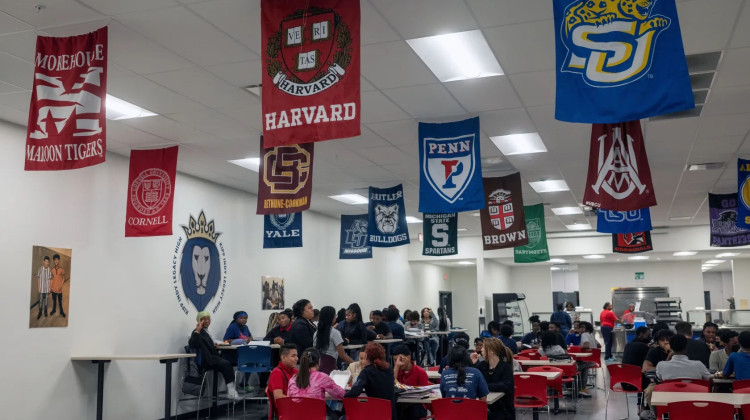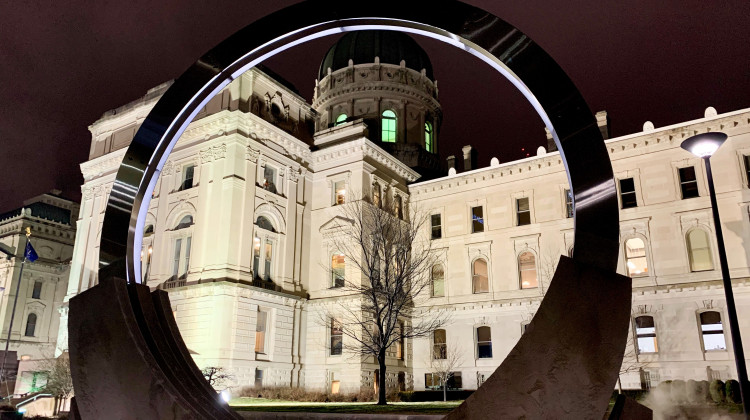
Supporters of a bill to require Indiana students to fill out the FAFSA say it could provide more financial aid for students to go to college, and perhaps encourage more students to enroll in the first place.
Maxine Wallace for ChalkbeatIndiana students could soon be required to fill out the Free Application for Federal Student Aid, a shift that supporters say could give students more money to go to college and convince more of them to enroll in higher education in the first place.
The Indiana House Education Committee voted 11-1 Wednesday to advance Senate Bill 167, which would create the requirement starting with the 2023-24 school year, although there would be several exceptions. Lawmakers also amended the bill Wednesday to have the requirement expire in 10 years.
“This money is going to be spent somewhere, when we have a chance to put our hand out, let’s take advantage of it,” state Sen. Jean Leising, a Republican and one of the bill’s authors, told fellow lawmakers last week.
If the bill becomes law, Indiana would join at least eight other states who have this law.
The FAFSA is the form that students need to file to be considered for federal financial aid such as grants, loans and scholarships. States and colleges also use the FAFSA to determine eligibility for their respective aid programs.
By not filing out the form, students in Indiana are leaving $69 million in Pell Grants on the table, Leising said last week.
“That doesn’t even count the [other] scholarships, we don’t even have an idea of that money that’s lost,” she added. “We have got to do something about this.”
And the money isn’t just for two- and four-year institutions. Filling out the FAFSA can also provide funds for students who want to use a Next Level Jobs Workforce Ready Grant for a short- or long-term credential, because the grant could use federal Pell Grant dollars.
The legislation would require all high schoolers to complete and submit the FAFSA by April 15 of their senior year, which is the deadline to be eligible for state aid in addition to federal aid.
The bill includes exceptions for students at certain nonpublic schools, and for students who have a parent sign a waiver (emancipated minors can also sign it for themselves) to decline to complete the form. A school principal or counselor can also waive the requirement if they are unable to reach the student’s parent or guardian by April 15 after “at least two reasonable attempts.”
There was some concern about the bill during committee meetings. Rep. Tonya Pfaff, a Democrat, said during the vote that while she was supporting the bill, she still had concerns about the burdens on school counselors and wanted to work on that.
However, the exception in the bill to limit the attempts to reach families has eased that concern for others. And it could give the bill crucial support, after years of unsuccessful attempts to require students to fill out the FAFSA.
Completion of the FAFSA is considered a leading indicator of college-going.
Just 53% of students in Indiana’s Class of 2020 went on to college, and many Hoosiers see college as too expensive. In a statewide survey by the Indiana Department of Education, only 27% of parents said postsecondary education is affordable.
A state dashboard of FAFSA completion shows that about 36% of Indiana’s high school seniors have completed a FAFSA.
It’s not that there aren’t efforts to get the word out from the state and other groups. Indiana has had College Goal Sunday, an in-person event to help families sign up, for more than 30 years.
But that doesn’t mean every student or family knows about the form or if it’s for them. And schools with higher rates of students receiving free and reduced-price lunch tend to have the lower completion rates, said Josh Garrison, associate commissioner for public policy for the Indiana Commission for Higher Education, in a previous House education committee meeting.
The legislation would make sure that filing out or not filling out the FAFSA is a choice, not happenstance of who found out about it, advocates of the bill said.
They added that filling out the form can also help reduce student debt. FAFSA qualifies students for government loans that have lower interest rates than the private loans that they would get without the form, Garrison said.
The committee meeting last week about the bill featured a show of support from organizations representing school boards, principals, and counselors, as well as public, private and community colleges in the state, and the Indiana and Indy chambers.
MJ Slaby oversees Chalkbeat Indiana’s coverage as bureau chief and covers higher education. Contact MJ at mslaby@chalkbeat.org. Chalkbeat Indiana partners with Open Campus on higher education coverage.
Chalkbeat is a nonprofit news site covering educational change in public schools.
 DONATE
DONATE






 Support WFYI. We can't do it without you.
Support WFYI. We can't do it without you.